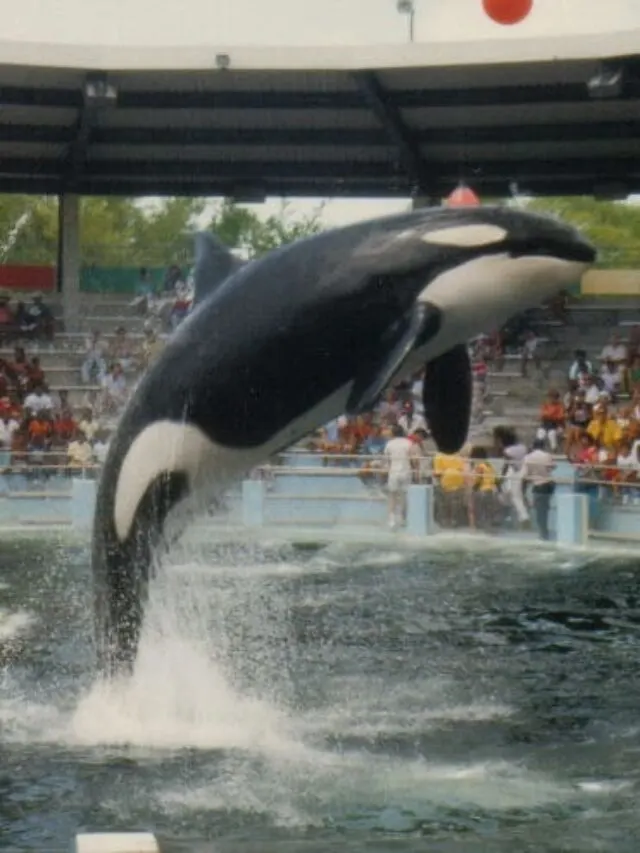Lolita, also known as Tokitae, was captured off the coast of Washington state in 1970 and was brought to the Miami Seaquarium. She became one of the oldest captive orcas in the world, spending over five decades in captivity. Her story became a symbol of the ethical concerns surrounding the captivity of marine animals for entertainment purposes.
About Lolita
The orca, first known as Tokitae or Toki, was only 4 years old when she was captured off the coast near Seattle. Over the next fifty years, Lolita became the big star at the Seaquarium, putting on shows about twice a day until 2022.

The fight for freedom
Advocacy groups and animal rights organisations have long protested Lolita’s captivity, arguing that she should be released into a more natural environment or at least into a larger and more suitable enclosure. The movement to free Lolita gained momentum over the years, with numerous protests and legal actions taken to improve her living conditions or secure her release. Supporters of her release pointed out that orcas are highly social and intelligent creatures, known for their complex behaviours and tight-knit family bonds. Keeping such a majestic creature in a confined tank was seen by many as a violation of her welfare.
The story develops
However, the Miami Seaquarium maintained that Lolita was well cared for and that her tank met all legal requirements. They argued that her age and long duration in captivity made her release a complex issue, raising concerns about her ability to survive in the wild. The debate surrounding Lolita’s captivity encapsulated larger discussions about the ethics of keeping marine mammals in captivity and the responsibilities of institutions that profit from their display.
Lolita’s death
According to the Seaquarium, Lolita, estimated to be around 57 years old, started showing “major signs of unease” in the days leading up to her untimely death. Despite receiving medical care, the orca passed away on Friday afternoon due to what seemed like a “kidney issue,” as stated by the Seaquarium.
“You were so close to freedom at a sanctuary, but time ran out. Now you’re finally free from all the pain and suffering,” PETA wrote on X.
Lessons for the future: Why orcas should not be kept in captivity
- Physical and Psychological Well-being: Orcas are highly intelligent, social, and wide-ranging creatures that require vast and complex ocean environments to thrive. Captive tanks, even the largest ones, are a tiny fraction of the size of their natural habitats. The limited space and lack of natural stimuli can lead to physical and psychological distress, causing behaviors like aggression, depression, and repetitive motions.
- Social Structure Disruption: Orcas in the wild live in tight-knit family pods with complex social structures. These pods form strong bonds and engage in cooperative hunting, communication, and caregiving for their young. In captivity, these relationships are disrupted, leading to social isolation, conflict, and a lack of opportunities for natural social behaviors.
- Stifled Natural Behaviors: Orcas are known for their high levels of activity, including swimming long distances, hunting, playing, and diving deep underwater. Captive environments limit these behaviors, leading to frustration, boredom, and potential physical health issues. The lack of stimulation can even result in self-harm or aggressive interactions with other captives.
- Health Complications: Orcas in captivity often face health challenges that they would not encounter in the wild. These include dental problems from chewing on concrete and steel, as well as stress-related conditions like ulcers. The water quality in captivity can also contribute to health issues, as the confined spaces can become contaminated more easily.
- Educational and Conservation Concerns: Proponents of captivity argue that it offers educational opportunities for the public and contributes to conservation efforts. However, studies have shown that these benefits can often be achieved more effectively through alternative means, such as virtual reality experiences, documentaries, and interactive exhibits that highlight the natural behaviours and habitats of these creatures without causing harm.
Let’s get inspired to do better for our animal kingdoms. Take a look at these orca-related articles to learn more about them:
Orca Almost Released After 50 Years In Captivity
Baby Orca asks Humans for help to Save Their Mother
Join our Forum for free today!

- The Kleptomaniac Cat That Rules Houston - July 20, 2024
- Elephant Makes a Lifelong Friend at Sanctuary in Tennessee - July 14, 2024
- Evidence For World’s Oldest Fossilized Forest Discovered in New York - July 11, 2024



